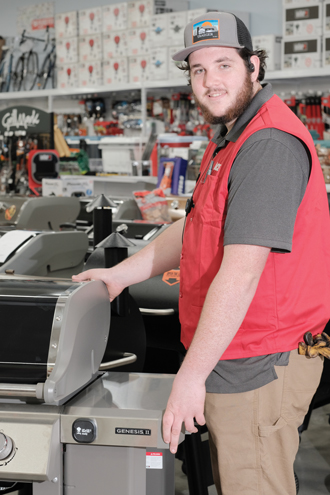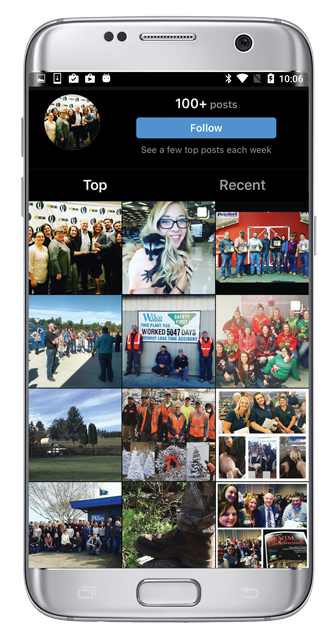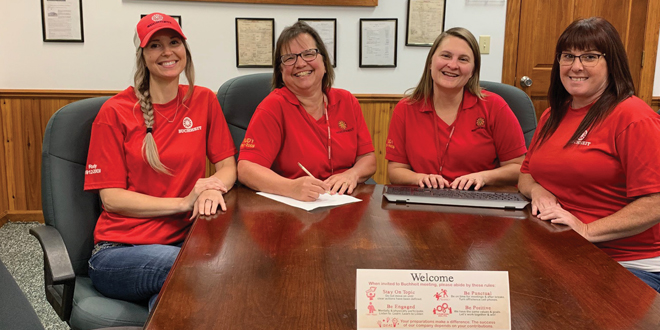Retailers across the country have expressed similar challenges when it comes to hiring long-term, qualified employees: It’s tough out there.
According to the U.S. Bureau of Labor Statistics, in 2019, unemployment was the lowest it had been in 50 years. The unemployment rate remained relatively unchanged throughout 2019, around 3.5 percent.
While low unemployment is generally considered good for the country and the economy, it does present challenges for employers, particularly in retail.

“Because the economy is good, applicants can afford to be choosy,” says Heuser Ace Hardware president Bobby Heuser. “We have a process that helps weed out the people who may not take the job seriously. On any given day, the position we need to fill the most changes, so we stay open to finding people with certain knowledge or backgrounds.”
Tony Lee, vice president of editorial for the Society for Human Resource Management and the organization’s authority on recruitment trends, says the paradigm for hiring has changed.
“It used to be that business owners could be picky and choose the applicants they thought would be the best hire in terms of customer service, knowledge or retention,” he says. “In today’s climate, all of those are important, but in many cases they are secondary to selling the opportunity to the candidate. In this market, you have to be proactive and assertive. If a store owner wants enough staff to function, they’re going to need to recruit.”
Developing a recruitment mindset for your business doesn’t have to mean hiring an agency to scout workers at other local businesses or competitors—although it could. Read on to learn about the creative hiring strategies that have worked for Heuser and two other retailers, and learn from Lee about the untapped labor markets you should consider to find employees with staying power.
1. SEEK RELATED SKILLS
Lee says there are several groups that tend to experience higher levels of unemployment than the general population, and they shouldn’t be overlooked.
“The No. 1 strategy that seems to be working in retail is hiring nontraditional candidates,” he says. “People with criminal histories, people with disabilities, workers who are past retirement age and veterans all have more of a struggle finding opportunities. They tend to be the most loyal employees you’re going to hire.”

Over the last five to 10 years, 35 states and more than 150 cities and counties have instituted “Ban the Box” laws, according to the National Employment Law Project, an organization that is dedicated to expanding access to good jobs. Ban the Box laws make it illegal to ask about a person’s past criminal history on job applications.
“The truth is, there is not a greater risk when it comes to hiring people with criminal histories,” Lee says. “You can screen out people with violent histories, but most offenses are drug-related. Once you extend an offer, you can do a background check.”
Another group that already has decades of experience: baby boomers who can’t afford to retire or who don’t want to retire. Lee says there is a lot of untapped talent in these groups, and there are often organizations in communities that help connect people to employers.
“Even if you just focus on those categories, you’re going to have a very loyal employee base,” Lee says.
Putting It in Action
Putting It in Action
“Our biggest filtering mechanism is that we require people to go online to apply,” Heuser says. “We ask them to download the application, fill it out, sign it and then email it back. In all reality, that’s simple, but people who aren’t serious about it don’t do it. Several team members discovered job opportunities at Heuser Ace Hardware events. And if they don’t want to do that much work to apply, then they won’t work out in this job.”
Heuser sees the community of retirees in Bluffton as a broad labor pool. On his staff, Heuser has two former police officers, two former teachers, a chemical engineer, a mechanical engineer, two former flight attendants and a former home inspector. He also has an employee with a Ph.D. in horticulture who is a professor at the local college and who hosts lectures and seminars at the store for customers.
“When we’re interviewing people, it’s not about what they know right now,” Heuser says. “It’s about the type of person they are, whether they will take the job seriously and if they have a thirst for knowledge.”
Heuser’s own background plays into his philosophy of hiring for the right fit instead of hiring for knowledge. He started as a mechanical engineer, earned his MBA and then went into finance before deciding to open the store with his parents.
“If you get the right person, you can ask them to do anything, and it works,” he says. “We try to hire people who want the store to be better tomorrow than it is today.”
The strategy has worked for Heuser Ace. The store has less than 10 percent turnover per year, and most of the people who leave are seasonal workers. A majority of the management team that started when the business opened is still on staff.
So when it came time to staff their second store, which opened in January just a few miles away from the original location, Heuser started with the same approach.
“Opening a whole new store meant we were hiring for all positions, but we’re not strict with hiring for specific roles,” he says. “They way we see it, the role needs to work with the talent that walks in the door. If the person fits into the culture, then you can grow them into the right place in the company.”
Heuser says brand recognition in the community has been one of the biggest drivers for applicants as he has gone through this round of staffing for the new store. One key opportunity he found to be successful this time around was to use in-store events essentially as job fairs.
“We hosted four events last fall, and at each one, we put up a ‘Now Hiring’ sign outside the store. After those events, we saw a big jump in the quality of applicants we received,” he says.
Heuser says he welcomes the applicants that arise from in-store events because it directly ties into the type of people he wants working in his company.
“The people who come to your events already want to be a part of your business, so they are often great employees,” he says.
While many retailers find word-of-mouth and employee recommendations to be reliable methods for finding new employees, Heuser relies on everyday interactions his employees have with customers. Two of his hires for the new store were walk-ins who, in casual conversation with associates, inquired about job openings because they liked the atmosphere in the store.
“We’ve been leaning on overall attitude and culture,” he says. “We want to load the store up with positivity because when customers see lots of smiles and everybody excited to be at work, it makes them wonder how they can be a part of it.”
In two months, Heuser hired 12 associates for his new store, and all of them came through attending an event or talking to a current associate while they were shopping the store.
“When we first started this process, we wasted a lot of time going through low-quality resumes, and we didn’t have luck using online hiring sites,” Heuser says. “We decided to double down on what’s been working for us, which is focusing on the people who come in who are aware of and excited about our brand.”
2. GO MOBILE
While retirees can be reliable employees, don’t dismiss younger generations because of lack of experience. According to the U.S. Bureau of Labor Statistics, teenage unemployment is at about 12.7 percent, indicating there are likely young people in your community who are eager for a part-time position.

When it comes to filling full-time positions, the pool gets even deeper. According to the Pew Research Center, the youngest millennials turn 24 year this year, which means all millennials are past average college age, and the majority are closer to 40 than they are to being teenagers. It also means that the oldest members of Generation Z, who were born after 1997, are aging into the workforce.
Lee says that information should have an effect on how you approach hiring and recruiting.
“Younger millennials and older members of Generation Z, who are often the target candidates for retail opportunities, are job-hunting on their phones,” he says. “If you don’t provide information or the ability to apply on mobile devices, you’re not going to reach those groups.”
Don’t mistake a preference for job-seeking on devices as an unwillingness to communicate in person, though. Lee says that while millennials tend to prefer to communicate over text, the younger generation prefers face to face.
“Generation Z has grown up online, so they tend not to trust everything they see online,” he says. “They don’t believe something until they hear it in person.”
Putting It in Action
Putting It in Action
Wilco Stores operates 20 locations in Washington state and Oregon, where vice president of human resources Lisa Smith says they have struggled to find qualified candidates. To find employees in a highly competitive job market, Smith says the company has developed a strategy that is centered on social media.
Three years ago, Wilco engaged a company that provides social media support for recruiting. They started focusing their attention on Facebook, Instagram and Twitter to get the word out about available jobs.
“We wanted to profile the type of store we are and show our employee group,” Smith says. “We use photos of current employees in all of our marketing, so when people come to our social media pages, they see what the atmosphere is really like.”
To support the social media outreach, Wilco also overhauled the employment section of its website. From videos showing daily life to an embedded Instagram feed displaying posts featuring the employee-embraced hashtag #OurWilcoLife, the website gives prospective employees detailed insights into what working for the company looks like.
If potential employees want to see what positions are open near them, the interactive map provides all the information they need. The mobile-friendly map shows how many positions and what types of roles are open at each Wilco store location. All the details for the jobs are available, including responsibilities, benefits and pay rate.
While this strategy hasn’t been a cure-all for Wilco’s challenges, it has helped in improving brand awareness of the company as an employer. The company has been named one of the top employers in Oregon by the Oregonian Media Group for many years running. Smith says they are proud of the people they bring on board, even if they don’t stay long-term.
“We know that this business has turnover. We’re going to see it, and we’re OK with it,” she says. “What’s more important is that employees are engaged during the time they do work with us, and this strategy helps us identify those people.”
3. KNOW YOUR COMPETITION
Many big-box stores, like Target, Walmart and Home Depot, have made headlines in the last two years as they have changed their approach to minimum wage, benefits and paid leave. Lee says it’s crucial that independent retailers know what other employers in their area are offering and to be as competitive as possible.
“When it comes to hourly workers, they are most concerned about compensation,” Lee says. “We’ve seen over and over again, a retailer losing five or six associates in a day because another business opens up and offers 25 cents more per hour.”

Differentiating yourself from competitors through valuable benefits can help you attract new recruits and improve your retention rates, but Lee says compensation is a key issue.
He says there has been a trend in a phenomenon called “ghosting.” People apply at a new job and accept it, only to take the offer back to their current employer to negotiate a better situation for them there and never show up to their new job. While hiring for culture fit and attitude can sometimes weed out people who do this, so can having a proactive approach to onboarding and having an honest conversation, Lee says.
“Ask them outright if they’re using your offer to increase their pay at their current employer,” Lee says. “If they’re serious about working for you, ask them to come in and work on a weekend before their official training starts to get a feel for the job.”
Putting It in Action
Putting It in Action
Director of human resources Petrina Jannin says the factories in the area create the biggest challenge to offering competitive pay, so they have focused on highlighting the schedule benefits of working for Buchheit.
“Most of our stores close at 8 p.m., which means they’re not going to be working the night shift like they would at a factory,” she says. “We also offer flexible schedules, and we try to get schedules out three weeks in advance. Our team members also rotate nights and weekends off, which is a big plus.”
Jannin says another strategy they use is to talk to young people in the area about the opportunities that exist in an operation like Buchheit. “
While we do have name recognition, a lot of younger people don’t understand where you can go in this industry,” she says. “It’s important that they understand if they start as a cashier, that doesn’t mean they will stay there.”
Representatives from Buchheit visit high school career fairs to talk about all the possible pathways that are available at the company. Students learn about opportunities in each department in the retail stores, like farm animal care, live goods, sporting goods and firearms.
“We show them that it’s not about coming to work and putting freight up on the shelves,” she says.
When it comes to gauging a culture fit, Jannin says they first start with a phone call to see why they’re interested in the position. Then the applicant has an in-person interview with the human resources coordinator and department supervisor. Finally, the candidate will talk with the store manager or assistant manager and walk the store.
“We make sure they really understand the role before they leave the interview.”
 Hardware Retailing The Industry's Source for Insights and Information
Hardware Retailing The Industry's Source for Insights and Information








